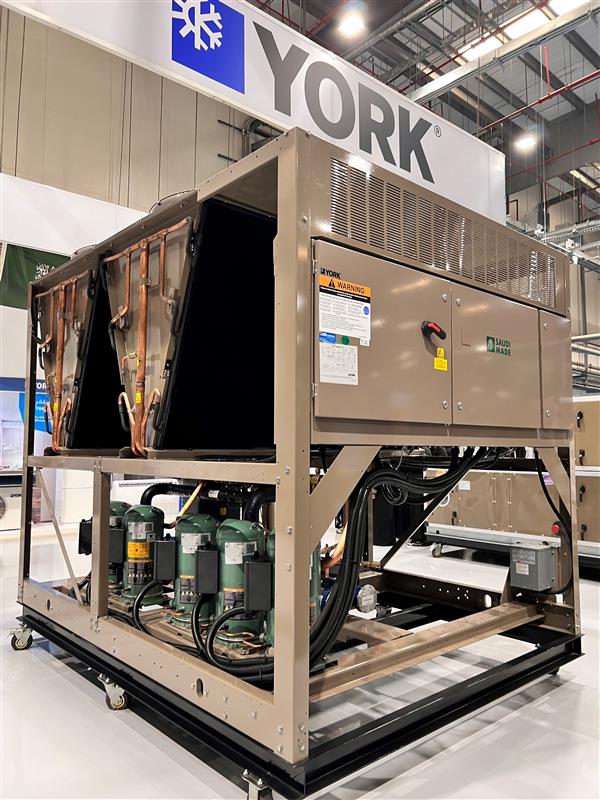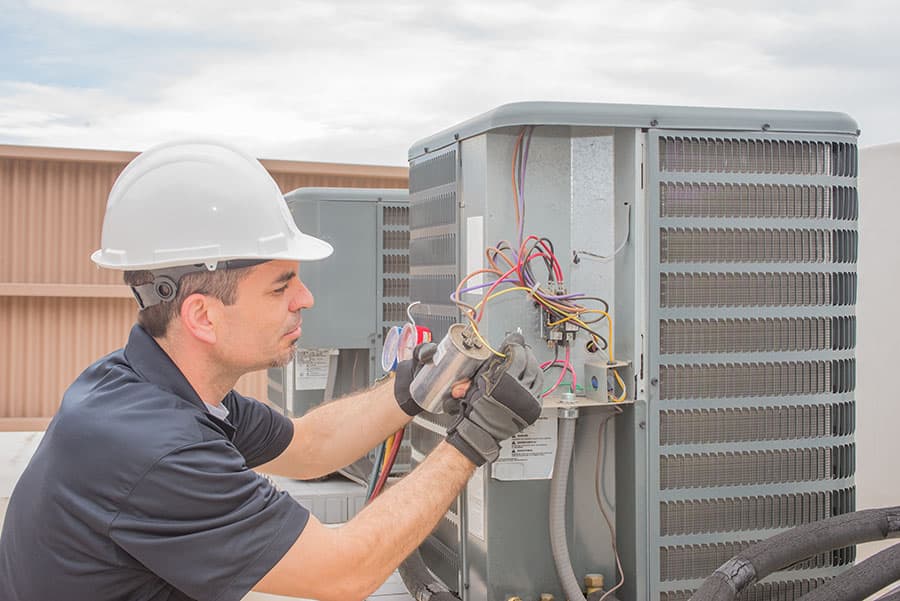Exploring the Essential Parts of an Effective HVAC System
A reliable heating and cooling system is built on several important components that work in harmony. Each component, from the thermostat to the ductwork, plays a vital function in maintaining comfort and energy effectiveness. Understanding these aspects is crucial for optimizing performance and improving interior air high quality. As one examines these elements, the intricate partnerships in between them disclose insights right into enhancing overall system performance. What particular variables contribute most to this performance?
The Duty of the Thermostat in Heating And Cooling Efficiency

Often neglected, the thermostat plays a vital role in the effectiveness of Cooling and heating systems. This tiny gadget serves as the main nerve center, regulating temperature settings and ensuring excellent convenience within a room. By properly picking up the ambient temperature, the thermostat interacts with the heating, ventilation, and air conditioning systems to keep the preferred environment
An efficient thermostat minimizes energy usage by turning on the cooling and heating system only when necessary, thereby protecting against too much home heating or air conditioning. Modern programmable and clever thermostats enhance this effectiveness further by enabling individuals to set routines and remotely adjust settings, adapting to daily regimens.
Additionally, the positioning of the thermostat is necessary; inappropriate place can bring about inaccurate temperature level analyses, leading to inefficient operation. Generally, a well-functioning thermostat not only improves comfort yet additionally adds noticeably to power savings and the durability of the cooling and heating system.
Comprehending the Value of Air Filters
Air filters serve an essential feature in heating and cooling systems by assuring that the air flowing within an area stays clean and healthy and balanced. These filters trap dust, allergens, and other pollutants, preventing them from being recirculated throughout the environment. By catching these fragments, air filters add to boosted interior air high quality, which can greatly benefit residents' wellness, specifically those with allergic reactions or respiratory system conditions.
In addition, maintaining tidy air filters boosts the effectiveness of cooling and heating systems. Clogged up filters can limit air movement, triggering the system to work tougher to keep wanted temperature levels, causing increased energy intake and higher utility expenses. Regularly changing or cleaning filters is a vital upkeep action that can prolong the lifespan of cooling and heating devices. Eventually, comprehending the relevance of air filters permits property owners and structure supervisors to take positive procedures to guarantee a well-functioning, effective heating and cooling system that promotes a comfortable and secure indoor atmosphere.

The Capability of the Heater and Heatpump
Furnaces and warm pumps are important components of cooling and heating systems, in charge of giving warmth throughout cooler months. Heaters run by heating air via burning or electrical resistance, then dispersing it throughout the home via ducts. They commonly use rapid heating and can be fueled by gas, power, or oil, depending upon the system type.
Conversely, heat pumps move warmth as opposed to produce it. They remove warmth from the outside air or ground, even in reduced temperatures, and transfer it indoors. HVAC experts. This dual performance enables warmth pumps to likewise give cooling in warmer months, making them versatile options for year-round climate control
Both systems call for appropriate maintenance to guarantee performance and durability. While heaters stand out in severe cold, heatpump can be helpful in modest environments. Recognizing their distinct capabilities aids homeowners in choosing one of the most suitable alternative for their home heating needs.
Discovering the A/c Device
The cooling unit is a vital component of a/c systems, offered in numerous types to fit different needs. Understanding the efficiency scores of these systems is necessary for making educated options concerning energy consumption and cost. This area will check out the diverse types of air conditioning system and clear up just how effectiveness scores impact efficiency.
Kinds Of Air Conditioners
While various factors influence the option of a/c systems, understanding the various types available is critical for home owners and structure supervisors alike. Central air conditioners are developed to cool down whole homes or structures, utilizing a network of air ducts for air movement. Window systems offer an even more localized service, ideal for solitary areas or small spaces. Mobile a/c offer flexibility, permitting individuals to relocate the device as required. Ductless mini-split systems are one more choice, incorporating the effectiveness of central systems with the ease of zoning, as they require no ductwork. Geothermal systems harness the earth's temperature for energy-efficient air conditioning. Each kind comes with unique advantages, making informed selections crucial for efficient climate control.

Effectiveness Scores Described
Understanding performance ratings is essential for choosing the ideal air conditioning system, as these metrics provide insight into the system's efficiency and energy intake. One of the most usual ranking for air conditioners is the Seasonal Power Effectiveness Proportion (SEER), which determines the cooling result during a regular cooling period split by the overall electrical energy input. A greater SEER indicates much better performance. Furthermore, the Energy Performance Ratio (EER) is utilized for gauging performance under details conditions. Another crucial metric is the Power Celebrity accreditation, which signifies that an unit meets rigorous energy effectiveness standards. By assessing these ratings, consumers can make enlightened selections that not just enhance comfort yet likewise lower energy costs and ecological impact.
The Relevance of Ductwork and Airflow
Effective ductwork style and air flow monitoring play essential roles in the overall effectiveness and performance of heating and cooling systems. Proper ductwork warranties that conditioned air is distributed equally throughout a room, decreasing temperature fluctuations and boosting convenience. Well-designed air ducts minimize resistance to airflow, reducing the work on heating and cooling equipment and inevitably reducing energy usage.
Air flow management includes tactically positioning vents and signs up to enhance the flow of air. This avoids typical concerns such as warm or cold areas, which can take place when air flow is blocked or improperly balanced. In addition, the appropriate air duct materials and insulation can even more boost efficiency by reducing warmth loss or gain throughout air transportation.
A reliable ductwork system not just adds to energy savings but can likewise prolong the life-span of HVAC devices by lowering unneeded strain (HVAC experts). Consequently, understanding the relevance of ductwork and airflow is essential for accomplishing peak a/c system performance
Routine Upkeep Practices to Enhance Performance
Routine upkeep techniques are essential for ensuring peak performance of cooling and heating systems. These techniques consist of routine inspections, cleaning, and necessary repair services to maintain the system running efficiently. Regularly changing air filters is essential, as blocked filters can block air flow and lower performance. Furthermore, technicians need to check and tidy evaporator and condenser coils to avoid getting too hot and energy wastefulness.
Yearly professional inspections are additionally recommended, as qualified specialists can recognize possible concerns prior to they escalate. Lubricating relocating parts minimizes damage, adding to a longer lifespan for the system. Ensuring that the thermostat operates appropriately aids in maintaining suitable temperature level control.
Frequently Asked Inquiries
Exactly how Frequently Should I Change My Thermostat?
Thermostats ought to click here generally be replaced every 5 to ten years, relying on use and technology advancements. Regular checks are a good idea to assure peak efficiency, specifically if experiencing irregular temperature level control or enhanced power costs.
What Size Air Filter Is Finest for My A/c System?
The most effective size air filter for a heating and cooling system differs by unit layout. Generally, it's crucial to speak with the owner's guidebook or examine the existing filter dimensions to guarantee peak efficiency and air high quality.
Can I Install a Heatpump Myself?
Setting up a heatpump separately is possible for experienced individuals, but it calls for expertise of electrical systems and regional codes. Working with a specialist is recommended to guarantee correct installation and optimal system efficiency.
Exactly how Do I Know if My Ductwork Is Reliable?
To figure out ductwork performance, one ought to check for leaks, measure air movement at vents, check insulation high quality, and examine temperature level differences in between supply and return air ducts. Professional assessments can supply extensive insights right into total efficiency.
What Are Signs My A/c Requirements Immediate Maintenance?
Indicators that a heating and cooling system requires prompt maintenance include unusual noises, inconsistent temperatures, raised power bills, undesirable odors, and constant biking. Attending to these concerns immediately can protect against more damage and guarantee top system performance.
Air filters serve an important function in HVAC systems by assuring that the air distributing within a space stays clean and healthy and balanced. In addition, maintaining clean air filters boosts the effectiveness of Heating and cooling systems. Ductless mini-split systems are one more choice, integrating the performance of central systems with the ease of zoning, as they call for no ductwork. Understanding performance rankings is vital for selecting the best air conditioning unit, as these metrics offer understanding into the system's performance and energy usage. The finest size air filter for a Heating and cooling system varies by device layout.